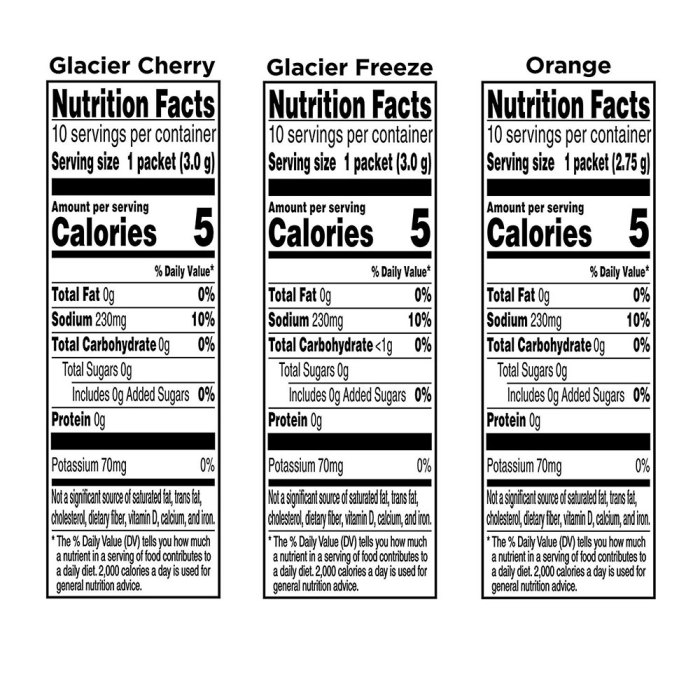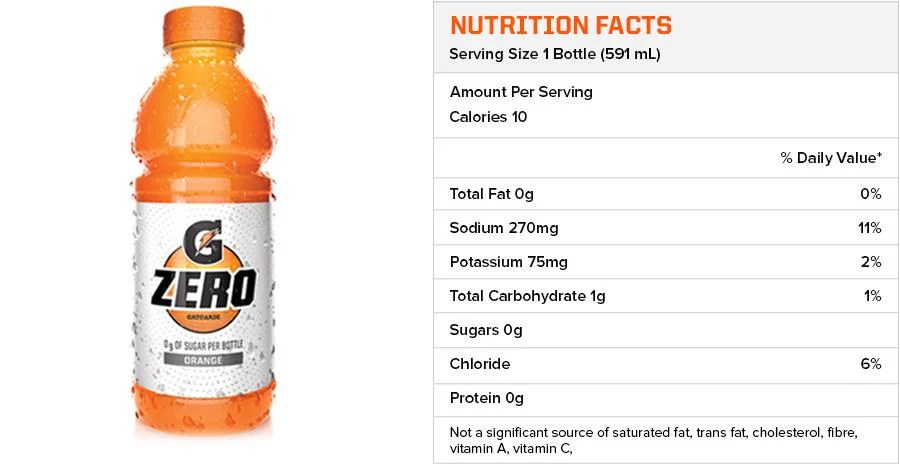Electrolyte Balance in Gatorade Zero

Gatorade zero nutrition facts – Gatorade Zero, marketed as a zero-calorie sports drink, aims to provide essential electrolytes without the added sugars found in its traditional counterparts. Understanding the role of electrolytes in hydration and athletic performance is crucial to evaluating its efficacy. Electrolytes are minerals that carry an electric charge when dissolved in fluids like sweat and blood, playing a vital role in numerous bodily functions.
Electrolytes, such as sodium, potassium, chloride, and magnesium, are lost through sweat during physical activity, particularly in prolonged or intense exercise. This loss can lead to dehydration and electrolyte imbalances, impacting performance and potentially causing muscle cramps, fatigue, and dizziness. Replenishing these lost electrolytes is therefore essential for maintaining optimal hydration and athletic function.
Gatorade Zero’s nutritional profile highlights its zero-calorie and carbohydrate content, making it attractive for those seeking hydration without added sugars. However, a comparison to the nutritional composition of other beverages, such as those detailed in the skim milk nutrition facts information, reveals significant differences in macronutrient profiles. Understanding these contrasts allows for informed choices regarding electrolyte replenishment and overall dietary intake, especially concerning the absence of protein and essential nutrients in Gatorade Zero.
Electrolyte Composition of Gatorade Zero per Serving
The precise electrolyte content can vary slightly depending on the flavor and production batch, but a typical 8-ounce serving of Gatorade Zero generally contains the following electrolytes:
- Sodium: Approximately 100-150 mg. Sodium is crucial for fluid balance and nerve and muscle function. Its presence in Gatorade Zero helps to promote fluid absorption in the intestines and maintain blood volume.
- Potassium: Approximately 20-30 mg. Potassium plays a key role in muscle contractions and nerve impulses. It works in conjunction with sodium to regulate fluid balance within cells and across cell membranes.
- Chloride: The exact amount varies but is present in a significant amount. Chloride is an important electrolyte that helps maintain fluid balance and assists in the proper functioning of nerve and muscle cells. It often accompanies sodium in sweat loss.
- Other Electrolytes: Gatorade Zero may also contain trace amounts of other electrolytes like magnesium, but these are typically present in lower concentrations than sodium and potassium.
Electrolyte Balance and its Importance in Hydration and Performance
Maintaining proper electrolyte balance is paramount for optimal hydration and athletic performance. During exercise, sweat loss depletes electrolytes, leading to dehydration if not adequately replaced. Dehydration reduces blood volume, decreasing the efficiency of cardiovascular function and oxygen delivery to working muscles. This results in decreased performance and increased risk of heat-related illnesses. The electrolytes in Gatorade Zero, particularly sodium and potassium, help to facilitate fluid absorption and maintain the body’s electrolyte balance, supporting hydration and mitigating the negative effects of sweat loss on athletic performance.
For example, a marathon runner losing significant amounts of sodium and potassium through sweat may experience muscle cramps and fatigue if these electrolytes are not replenished. Consuming a beverage like Gatorade Zero during the race can help to prevent these issues by maintaining a more stable electrolyte balance, allowing the runner to maintain performance and avoid serious complications.
Gatorade Zero and its Impact on Health

Gatorade Zero, a sugar-free sports drink, presents a complex picture regarding its impact on health. While marketed as a hydration and electrolyte replenishment tool, its regular consumption, like any other beverage, carries both potential benefits and drawbacks that depend heavily on individual factors such as activity level, overall diet, and pre-existing health conditions. Understanding these aspects is crucial for making informed choices about its inclusion in one’s diet.
Potential Benefits of Gatorade Zero Consumption, Gatorade zero nutrition facts
The primary benefit of Gatorade Zero lies in its ability to replenish electrolytes lost through sweat during physical activity. Electrolytes, including sodium and potassium, are crucial for maintaining fluid balance, muscle function, and nerve transmission. Excessive sweating, particularly during prolonged or intense exercise, can deplete these vital electrolytes, leading to cramps, fatigue, and impaired performance. Gatorade Zero, with its low-calorie and zero-sugar formulation, provides a convenient way to replace these electrolytes without the added sugars found in traditional sports drinks.
- Improved hydration during and after exercise.
- Reduced risk of muscle cramps and fatigue associated with electrolyte imbalance.
- Enhanced athletic performance, particularly in endurance activities.
- Maintenance of optimal electrolyte balance, supporting normal bodily functions.
- Potential aid in rehydration following illness, particularly if accompanied by diarrhea or vomiting, although medical advice should always be sought.
Potential Negative Health Consequences of Long-Term Gatorade Zero Consumption
While Gatorade Zero avoids the pitfalls of added sugar, long-term, excessive consumption can still present potential health risks. The high sodium content, while beneficial for electrolyte replenishment during exercise, can contribute to high blood pressure in individuals already predisposed to hypertension or those consuming it excessively without sufficient physical activity to warrant the sodium intake. Furthermore, the artificial sweeteners used in Gatorade Zero have been the subject of ongoing research regarding their long-term health effects.
Although current research hasn’t established definitive negative consequences, some studies suggest potential links to metabolic changes. Finally, relying on Gatorade Zero as a primary hydration source can displace the consumption of water, which remains the optimal choice for daily hydration needs.
Suitability of Gatorade Zero for Different Demographics
The suitability of Gatorade Zero varies considerably depending on the individual. For athletes engaged in intense or prolonged exercise, it can be a valuable tool for electrolyte replenishment and performance enhancement, particularly when water alone is insufficient. However, even athletes should prioritize water as their primary hydration source and use Gatorade Zero judiciously. Non-athletes generally do not require the electrolyte boost provided by Gatorade Zero; water is a far more suitable and healthier choice for daily hydration.
Individuals with specific dietary needs, such as those with kidney disease or those monitoring sodium intake, should consult a healthcare professional or registered dietitian before incorporating Gatorade Zero into their diet. For example, individuals with hypertension should be cautious due to its sodium content, and those with diabetes may need to consider the impact of artificial sweeteners on their blood sugar levels, even if it’s sugar-free.
Frequently Asked Questions: Gatorade Zero Nutrition Facts
Does Gatorade Zero contain any sugar?
No, Gatorade Zero is marketed as a sugar-free beverage.
Are artificial sweeteners safe for long-term consumption?
The long-term effects of artificial sweeteners are still under research and debate. Consult a healthcare professional for personalized advice.
Is Gatorade Zero suitable for children?
While it’s low in calories and sugar, it’s best to consult a pediatrician before giving it to children, particularly younger ones. Water remains the best hydration option for most children.
Can I use Gatorade Zero for weight management?
It can be part of a balanced diet for weight management due to its low calorie count, but it shouldn’t replace water or other healthy beverages entirely.
What are the best alternatives to Gatorade Zero?
Water is always the best option for hydration. Other alternatives include electrolyte-enhanced water, coconut water, and fruit-infused water.
